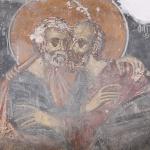
Grace comes to us from God, providing us the means to share in and participate in the divine life. There are a variety of ways we can receive it, each with its own particular way to makes us better. God gives us grace out of love, hoping for us to engage grace in the same way, with love, not only with love towards God, but for us to love all that God loves. We are meant to receive grace, not only for our own personal benefit, but, for the good of all. We must not selfishly take it in, thinking we have been given it for our own exclusive use, nor to jealously guard what we have been given, making sure no one else can receive any benefit from it. For, if we did that, we would no longer be following the way of love, and insofar as we depart from love, we will cut ourselves off from God and God’s grace.
When we love, we give ourselves over to others, sharing what we have with them. The more we do this, the more we exercise our love, the greater our potency for love will be, and with a greater potency for love, we will find ourselves more receptive of God’s love and the graces which flow from it. And with more grace, the more we will be able to love, and so, the more we will find ourselves capable of sharing ourselves with others. Thus, whatever gift we have been given, Paul says, we should find the right way to use it for the good of others, doing so with cheerful zeal:
Having gifts that differ according to the grace given to us, let us use them: if prophecy, in proportion to our faith; if service, in our serving; he who teaches, in his teaching; he who exhorts, in his exhortation; he who contributes, in liberality; he who gives aid, with zeal; he who does acts of mercy, with cheerfulness (Rom. 12:6-8 RSV).
We are meant to be the salt of the earth, preserving the good in all things. Grace helps us do this. As God is love, this means we should find ourselves becoming more and more like God, reflecting that love, sharing with everyone the gifts we have received from God. Those gifts will transform us, helping us imitate Christ, and Christ’s ways, including the way Christ showed God’s love to the world by his willingness to share divine forgiveness to everyone, including those who were involved in his crucifixion. That is, as Christ came into the world to share with it God’s forgiving love, we, like Christ, will also learn to forgive everyone, even those who persecute us, showing them in this way the radical way love:
Let love be genuine; hate what is evil, hold fast to what is good; love one another with brotherly affection; outdo one another in showing honor. Never flag in zeal, be aglow with the Spirit, serve the Lord. Rejoice in your hope, be patient in tribulation, be constant in prayer. Contribute to the needs of the saints, practice hospitality. Bless those who persecute you; bless and do not curse them (Rom, 12:9-14 RSV).
What exists, in accordance to its existence, is good; evil seeks to corrupt and destroy that good. Hating evil must be understood as a form of poetic diction indicating the way we dislike that corruption and hope to see its reversal, that is, for the natural good which evil destroyed to be restored, if not strengthened and made better by grace. We can love one another with zeal when we understand everyone, even those who persecute us, has some good in them, some good which we can love and lift up.
We should hate the way of the wicked, not the wicked themselves. We must not seek their annihilation; we must not desire their death. Instead, we should hope to free them from the wickedness which have corrupted them and made them go astray; if that happens, then they are no longer wicked, but rather, become a part of those who do good, as St. Jerome said happened with Paul:
‘But the way of the wicked vanishes.’ That does not mean that the wicked will perish. If they repent and do penance, they too will be saved. When the Apostle Paul was persecuting Christ and His Church, he was wicked. If the wicked perish, there is no chance for their repentance. It does not say that the wicked shall perish, but the way of the wicked vanishes, that is, wickedness shall perish. Not the wicked, but wickedness itself; not the one who was wicked will perish, but while he is repenting, wickedness vanishes. [1]
We can see this reflected in the way Jesus healed a paralytic man. The man was healed, he was not destroyed, when he was freed from the paralysis which afflicted him. Sin, itself, often keeps us paralyzed, incapable of doing the good which we should do. With grace, we find ourselves recovering from that paralysis, so that we can become who God wants us to be. Similarly, Jesus said that those who looked down upon him and thought evil thoughts about him should, likewise, cease and desist from such evil thoughts, because such thoughts were corrupting those who heeded them, turning them into those who follow the ways of the wicked:
And behold, they brought to him a paralytic, lying on his bed; and when Jesus saw their faith he said to the paralytic, “Take heart, my son; your sins are forgiven.” And behold, some of the scribes said to themselves, “This man is blaspheming.” But Jesus, knowing their thoughts, said, “Why do you think evil in your hearts? For which is easier, to say, `Your sins are forgiven,’ or to say, `Rise and walk’? But that you may know that the Son of man has authority on earth to forgive sins” — he then said to the paralytic — “Rise, take up your bed and go home.” And he rose and went home. When the crowds saw it, they were afraid, and they glorified God, who had given such authority to men (Matt. 9:2:-8 RSV).
Jesus seeks to heal everyone from whatever evil hinders them, be it some natural evil like the paralysis which afflicted the man brought to him. or some willful evil, such as seen coming from those who tried to undermine Jesus’ ministry. We should learn how he sought to show his love to everyone, each in a way which suited their particular needs, and seek to do likewise. The more we do so, the more we will see the grace is it work in our lives, and we will find ourselves becoming more and more like Jesus, and therefore, more and more like God.
[1] St. Jerome, The Homilies of Saint Jerome: Volume I (1-59 On the Psalms). Trans. Marie Liguori Ewald, IHM (Washington, DC: CUA Press, 1963), 13 [Homily 1].
Stay in touch! Like A Little Bit of Nothing on Facebook.
If you liked what you read, please consider sharing it with your friends and family!
N.B.: While I read comments to moderate them, I rarely respond to them. If I don’t respond to your comment directly, don’t assume I am unthankful for it. I appreciate it. But I want readers to feel free to ask questions, and hopefully, dialogue with each other. I have shared what I wanted to say, though some responses will get a brief reply by me, or, if I find it interesting and something I can engage fully, as the foundation for another post. I have had many posts inspired or improved upon thanks to my readers.













